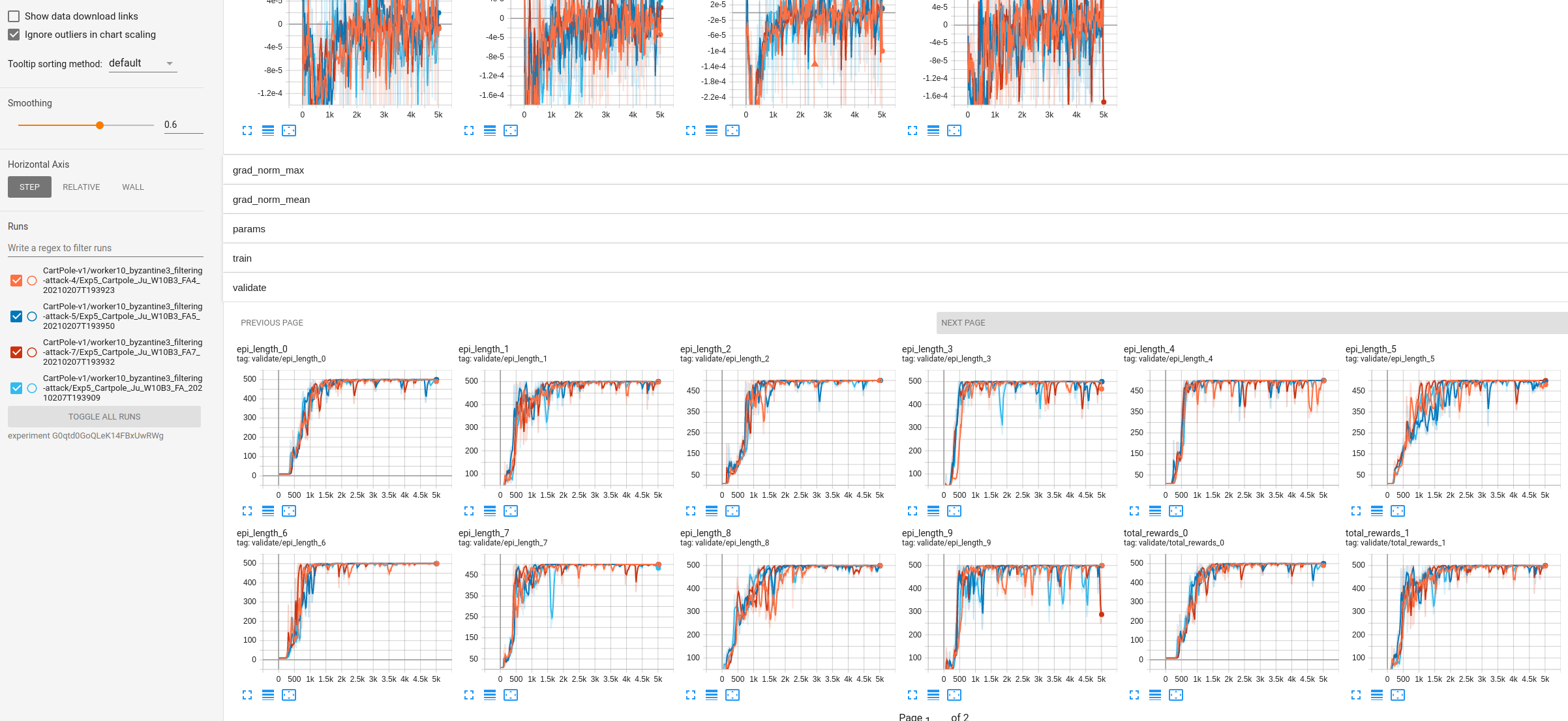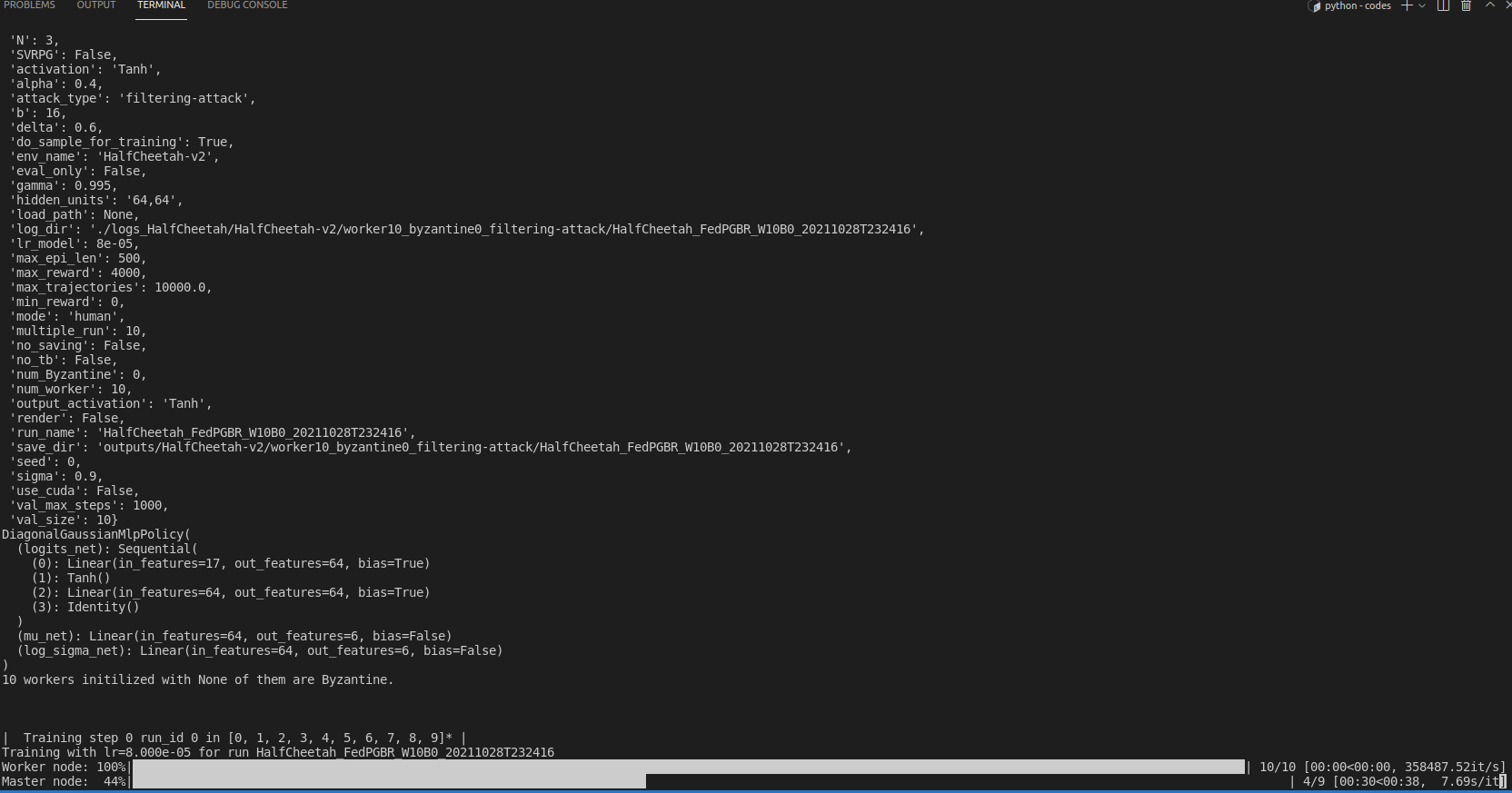This is the code for the FedPG-BR framework presented in the paper:
Flint Xiaofeng Fan, Yining Ma, Zhongxiang Dai, Wei Jing, Cheston Tan and Kian Hsiang Low. "Fault-Tolerant Federated Reinforcement Learning with Theoretical Guarantee." In 35th Conference on Neural Information Processing Systems (NeurIPS-21), Dec 6-14, 2021.
The experiments in the paper were conducted on Ubuntu 18.04 with a 14 cores (28 threads) Intel(R) Core(TM) i9-10940X CPU @ 3.30GHz and 64G memory.
We also tested on Ubuntu 20.04 with an 8 cores (16 threads) Intel(R) Core(TM) i9-11900K CPU @ 3.50GHz and 128G memory. Some extra steps may be necessary for this CPU which we gave details in installation.
- Python 3.7
- Pytorch 1.5.0
- numpy
- tensorboard
- tqdm
- sklearn
- matplotlib
- OpenAI Gym
- Box2d [for running experiments on LunarLander environment]
- mujoco150
- mujoco-py 1.50.1.68 [for running experiments on HalfCheetah environment]
$ conda create -n FedPG-BR pytorch=1.5.0
$ conda activate FedPG-BR
Please then follow the instructions here to setup mujoco and install mujoco-py. Please download the legacy version of mujoco (mujoco150) as we did not test using the latest version of mujoco.
Once you have ensured that mujoco_py has been successfully installed, proceed with
$ pip install -r requirements.txt
For centain CPUs, if you run into issue of Intel MKL FATAL ERROR: Cannot load libmkl_avx512.so or libmkl_def.so, then follow this solution. It will reinstall certain packages for certain intel chips and also removes pytorch and mujoco-py. So you will want to reinstall pytorch (1.5.0) and mujoco-py (1.50.1.68)
To check your installation, run
$ python run.py --env_name HalfCheetah-v2 --FedPG_BR --num_worker 10 --num_Byzantine 0 --log_dir ./logs_HalfCheetah --multiple_run 10 --run_name HalfCheetah_FedPGBR_W10B0
If terminal returns messages similar to those shown below, then your installation is all good.
To reproduce the results of FedPG-BR (K= 10) in Figure 1 for the HalfCheetah task, run the following command:
$ python run.py --env_name HalfCheetah-v2 --FedPG_BR --num_worker 10 --num_Byzantine 0 --log_dir ./logs_HalfCheetah --multiple_run 10 --run_name HalfCheetah_FedPGBR_W10B0
To reproduce the results of FedPG-BR (K= 10B= 3) in Figure 2 where 3 Byzantine agents are Random Noise in theHalfCheetah task environment, run the following command:
$ python run.py --env_name CartPole-v1 --FedPG_BR --num_worker 10 --num_Byzantine 3 --attack_type random-noise --log_dir ./logs_Cartpole --multiple_run 10 --run_name Cartpole_FedPGBR_W10B3
Replace --FedPG_BR with --SVRPG for the results of SVRPG in the same experiment.
All results including allstatistics will be logged into the directory indicated by‘--log_dir‘, which can be visualized in tensorboard by running tensorboard accordingly, e.g., tensorboard --logdir logs_Cartpole/ --host localhost --port 8008
You will be able to visualize different stats of each run there, e.g.,

To visualize the behavior of the learnt policy, run the experiment in evaluation mode with rendering option on. For example:
$ python run.py --env_name CartPole-v1 --FedPG_BR --eval_only --render --load_path PATH_TO_THE_SAVED_POLICY_MODEL
See the video file ./FedPG-BR_demo_edited.mp4
This research/project is supported by ASTAR under its RIE$2020$ Advanced Manufacturing and Engineering (AME) Industry Alignment Fund – Pre Positioning (IAF-PP) (Award A$19$E$4$a$0101$) and its ASTAR Computing and Information Science Scholarship (ACIS) awarded to Flint Xiaofeng Fan. Wei Jing is supported by Alibaba Innovative Research (AIR) Program.
